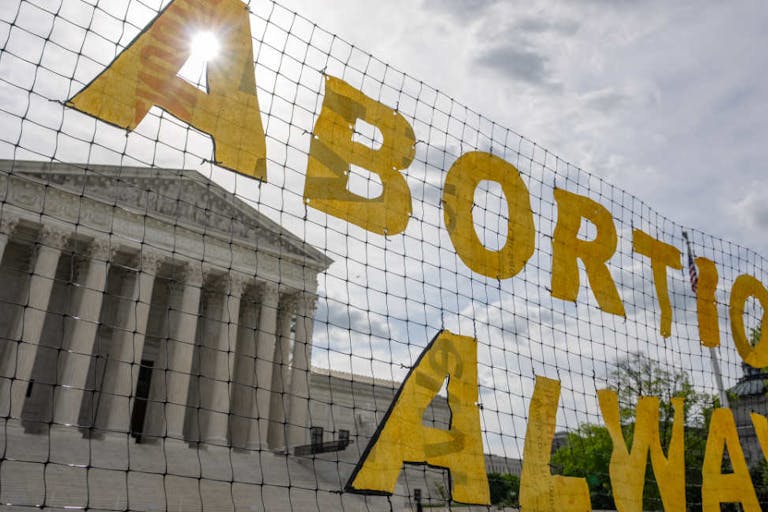
A growing number of Americans call themselves ‘pro-choice’ – but what’s really behind it?
Nancy Flanders
·
Issues·By Anne Marie Williams, RN, BSN
Oregon bill targets Catholic healthcare mergers because they don’t provide abortion
At the tail end of the legislative session last week, Oregon’s House and Senate both voted to pass a bill targeting Catholic healthcare systems for their pro-life values.
H.B. 2362, known as the Equal Access to Care Act, applies to any “entities that had $25 million or more in net patient revenue in preceding three fiscal years or before mergers, acquisitions or affiliations that will result in one entity having increase in net patient revenue of $1 million or more.” Under this wording, the bill will directly impact the ability of Catholic healthcare systems in the state to enter into mergers, acquisitions, or affiliations by making such business decisions contingent on the approval of the state’s Department of Consumer and Business Services or the Oregon Health Authority.
An op-ed in the Statesman Journal by the bill’s main sponsor, Democratic Rep. Andrea Salinas, insisted that the bill “tackles the issue of healthcare consolidation. This is an urgent issue as there is clear, expert evidence that consolidation leads to higher prices, does not necessarily improve quality, and can lead to reductions in services.” Her words were apparently pulled from a document compiled by Oregon healthcare worker union SEIU Local 49, titled “Bigger, Not Better: The High Cost of Healthcare Consolidation,” which states that “this kind of consolidation leads to higher prices, does not necessarily improve quality, and can lead to reductions in services.” Certainly, a conversation can be had about healthcare mergers or acquisitions resulting in higher costs, though that same conversation certainly ought also to include a discussion about the known significant impact of Affordable Care Act (Obamacare) policies on such costs.
READ: Becerra investigates Catholic health care chain for imposing ethical restrictions on hospital
But according to CruxNow, the documented increased cost of healthcare isn’t the primary driver for the Oregon bill.
The real driver is the Catholic identity of the systems likely to enter into such mergers, acquisitions, and affiliations, and their unwillingness to provide abortions, sterilizations, and potentially contraception. As the CruxNow article explains, “Implicit but looming large was the aim of curbing Providence Health and Services, the largest health provider in Oregon. Because of Providence’s Catholic mission, it does not do abortions. Supporters of legal abortion have objected more as Providence has expanded.”
Article continues below
Dear Reader,
Have you ever wanted to share the miracle of human development with little ones? Live Action is proud to present the "Baby Olivia" board book, which presents the content of Live Action's "Baby Olivia" fetal development video in a fun, new format. It's perfect for helping little minds understand the complex and beautiful process of human development in the womb.
Receive our brand new Baby Olivia board book when you give a one-time gift of $30 or more (or begin a new monthly gift of $15 or more).
The “Bigger, Not Better” document mentioned above acknowledged as much, noting “Consolidation can also lead to restrictions on reproductive, gender-affirming, and end-of-life care when partnerships are formed with healthcare entities affiliated with the Catholic church. In Oregon, 30 percent of acute care beds are controlled by systems that restrict access to these services.”
Fundamentally, the text of H.B. 2362 confirms this as well. Criterion for oversight by the DCBS or OHA includes any “transaction that will result in the health care entity no longer providing: (i) Reproductive health services including, but not limited to, tubal ligation, abortion or contraceptive counseling.”
In truth, Rep. Salinas’ reference in her op-ed to known “reductions in services” after healthcare mergers appears to actually mean “reduction in access to abortion” when Catholic health systems merge with, acquire, or affiliate with non-Catholic hospitals or health systems.
As Oregon Right to Life succinctly noted, the net impact of H.B. 2362 will be to “give Gov. Brown’s pro-abortion administration more control over the business aspects of pro-life health care entities.” Oregon Governor Kate Brown is expected to sign the bill into law.
“Like” Live Action News on Facebook for more pro-life news and commentary!
Live Action News is pro-life news and commentary from a pro-life perspective.
Contact editor@liveaction.org for questions, corrections, or if you are seeking permission to reprint any Live Action News content.
Guest Articles: To submit a guest article to Live Action News, email editor@liveaction.org with an attached Word document of 800-1000 words. Please also attach any photos relevant to your submission if applicable. If your submission is accepted for publication, you will be notified within three weeks. Guest articles are not compensated (see our Open License Agreement). Thank you for your interest in Live Action News!

Nancy Flanders
·
Politics
Bridget Sielicki
·
Issues
Sheena Rodriguez
·
Guest Column
Right to Life UK
·
Issues
Bridget Sielicki
·
International
Cassy Cooke
·
Human Interest
Anne Marie Williams, RN, BSN
·
Issues
Anne Marie Williams, RN, BSN
·
Analysis
Anne Marie Williams, RN, BSN
·
Analysis
Anne Marie Williams, RN, BSN
·
Issues
Anne Marie Williams, RN, BSN
·